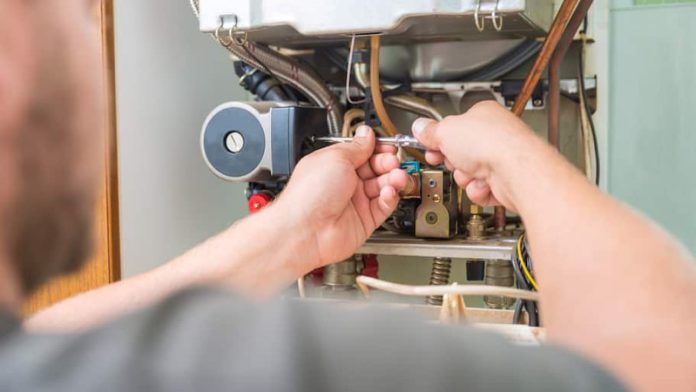Electric furnace vs. Gas furnace – Which One Should You Choose?
A new furnace can be a costly investment for homeowners. That’s why when it’s time to equip your new home or replace your old heating system, it’s essential to consider the cost, efficiency, and longevity of your new furnace.
The experts at Conejo Valley Heating and Air have put together this comparison of gas vs. electric furnaces to help homeowners and contractors decide on the right furnace for your home. We’ll examine the pros and cons of gas and electric heating systems and go through the cost of electric furnace vs. gas so you can make an informed decision.
What are the Differences Between Gas vs. Electric Furnaces?
Gas vs. Electric furnace. What’s the difference? While both heating systems work to heat your home’s air through the ducts, they significantly differ in terms of installation, efficiency, maintenance, and overall comfort.
-
Installation
Electric furnace installation is generally cheaper and more straightforward than gas furnace installation. You’ll need to have a carbon monoxide detector installed in your home if you choose a gas furnace, as they come with the risk of carbon monoxide emissions.
-
Heat and Energy
Gas vs. Electric furnace. Which is more energy efficient? As you might expect, an electric furnace is more efficient than a gas furnace. An electric heating system may have an annual fuel-utilization-efficiency (AFUE) rating of as high as 100%, while gas furnace ratings typically range from 55 to 97%.
It is worth noting that while electric heaters provide high-efficiency heating, gas furnaces use less energy to heat the same amount of space and can also heat homes quicker.
-
Maintenance
Which is easier to maintain between gas vs. electric furnaces? Electric furnaces are cheaper to maintain as they lack a burner that needs cleaning and regular maintenance, unlike gas furnaces.
-
Longevity
The average lifespan of electric furnaces is 20-30 years, while a gas furnace typically lasts only 15-20 years.
-
Safety
Electric furnaces tend to be safer than a gas furnace system which combusts fuel, producing carbon monoxide, which can be harmful if a leak occurs. However, gas furnaces are also a safe option if you ensure your unit gets regular maintenance performed by a professional HVAC company.
How Do the Furnaces Work?
A furnace works by warming air, water, or steam, then directing this warmth to rooms throughout your house via the ductwork.
In a natural gas furnace, the burner burns propane or natural gas to generate heat, which passes through a heat exchanger, heating the air to the temperature set by the thermostat. A blower then circulates air through the heat exchanger, forcing cold air through the heat exchanger and distributing the heated air throughout the home.
An electric heat furnace acts much like a hair dryer. An electric motor pulls air into the system and through a heat exchanger, where electric heating elements warm up the air to the temperature set by the thermostat. The blower then pushes this warm air through your home’s ductwork, distributing it throughout your home.
Cost of Gas Furnaces vs. Electric Furnaces
Are you thinking about a furnace replacement but are unsure of the prices? Here’s the cost of an electric furnace vs. gas.
On average, a new electric furnace costs $2000 to $5,600 installed, while a gas furnace will set you back between $4,500 to $6,000 installed. The cost factors include your location, the unit size, the home’s square footage, and the heater’s energy efficiency levels.
So, which is cheaper, gas or electric furnace? Indeed, electric furnaces usually cost less to purchase and install. However, they may cost more money to operate since electric heaters use more power than natural gas.
The Pros and Cons of Gas and Electric Furnaces
Since there are no perfect products, there are good points and downsides to electric and natural gas heaters, too.
Gas Furnace
Pros
- More cost-efficient
- Lasts up to 20 years
- Higher heat efficient
- Better for colder climates
Cons
- More expensive
- Complicated installation
- Shorter service life
- Carbon monoxide safety concerns
- Needs regular professional maintenance
- Noisier
Electric Furnace
Pros
- Lower upfront cost
- Easier installation
- Low maintenance
- Safer and quieter
- Lasts up to 30 years
- Better for warmer climates
Cons
- More expensive long-term
- Less heat efficient
- Dry air
Things to Consider When Choosing a New Furnace
Here are eight factors to keep in mind when shopping for a new furnace:
1. Choose the Most Efficient Furnace in Your Budget
Check the annual fuel utilization efficiency (AFUE) rating and choose a furnace with the highest possible AFUE for its respective fuel type.
2. Programmable Thermostat
Consider adding a programmable thermostat to even further boost the efficiency of your furnace by reducing the amount of work it does.
3. Zoning
Zoning is another excellent way to boost the efficiency and comfort provided by your furnace while reducing energy costs.
4. Size of the Unit
Getting the ideal size furnace for your home is the most critical consideration. Bigger is not always better, and smaller isn’t always cheaper.
5. Warranty
Your furnace of choice should include at least one manufacturer warranty for the parts.
6. Extra Costs
Be prepared to pay other costs that may come into play.
7. Price
Don’t make your decision based solely on price. Instead, consider your needs, budget, purchase price, and long-term costs.
8. Quality Installation
Don’t cheap out on proper installation, as the quality installation is a crucial component of your unit’s overall performance, efficiency, and life expectancy.
Gas vs. Electric Furnaces? Need Help Making a Choice?
When it’s time to upgrade your gas furnace, the Conejo Valley Heating and Air Conditioning experts in Newbury Park have you covered from start to finish. We can help you decide on the best product for your home. Contact our friendly team for a free consultation and estimate if you’re in the market for a new heating system in the Conejo Valley, San Fernando Valley, and surrounding areas. Call 805-499-0448 today for professional HVAC services!















